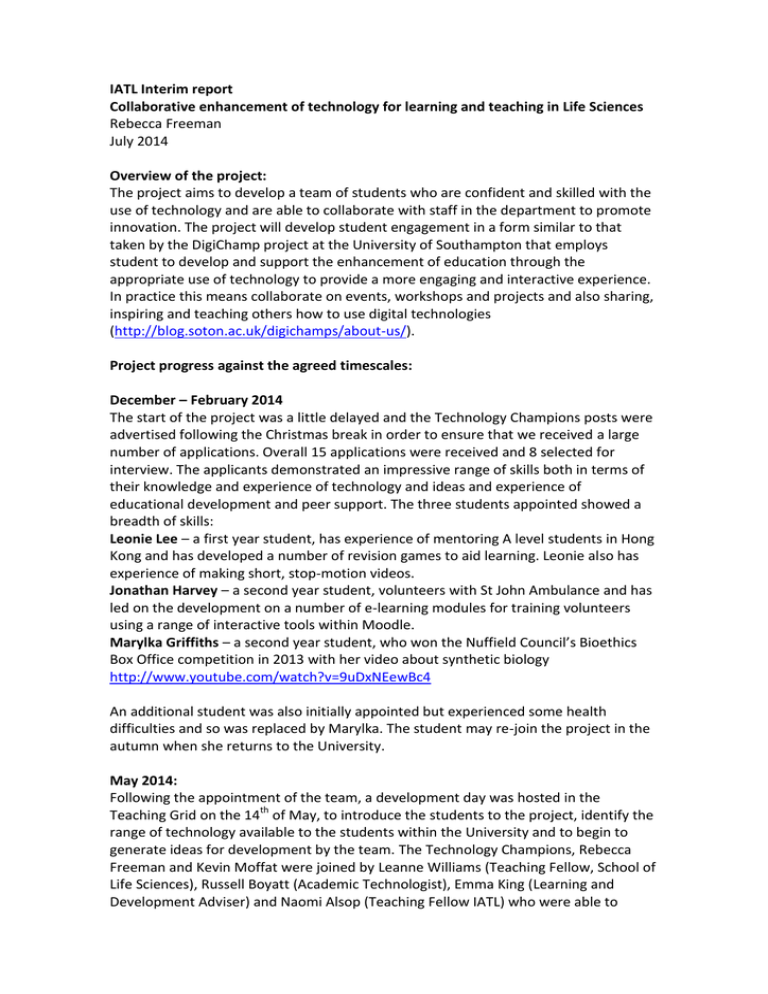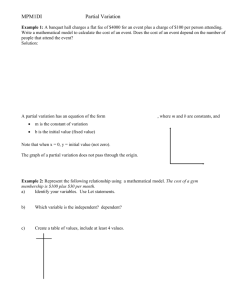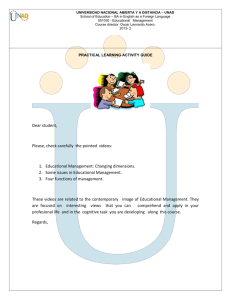IATL Interim report
advertisement

IATL Interim report Collaborative enhancement of technology for learning and teaching in Life Sciences Rebecca Freeman July 2014 Overview of the project: The project aims to develop a team of students who are confident and skilled with the use of technology and are able to collaborate with staff in the department to promote innovation. The project will develop student engagement in a form similar to that taken by the DigiChamp project at the University of Southampton that employs student to develop and support the enhancement of education through the appropriate use of technology to provide a more engaging and interactive experience. In practice this means collaborate on events, workshops and projects and also sharing, inspiring and teaching others how to use digital technologies (http://blog.soton.ac.uk/digichamps/about-us/). Project progress against the agreed timescales: December – February 2014 The start of the project was a little delayed and the Technology Champions posts were advertised following the Christmas break in order to ensure that we received a large number of applications. Overall 15 applications were received and 8 selected for interview. The applicants demonstrated an impressive range of skills both in terms of their knowledge and experience of technology and ideas and experience of educational development and peer support. The three students appointed showed a breadth of skills: Leonie Lee – a first year student, has experience of mentoring A level students in Hong Kong and has developed a number of revision games to aid learning. Leonie also has experience of making short, stop-motion videos. Jonathan Harvey – a second year student, volunteers with St John Ambulance and has led on the development on a number of e-learning modules for training volunteers using a range of interactive tools within Moodle. Marylka Griffiths – a second year student, who won the Nuffield Council’s Bioethics Box Office competition in 2013 with her video about synthetic biology http://www.youtube.com/watch?v=9uDxNEewBc4 An additional student was also initially appointed but experienced some health difficulties and so was replaced by Marylka. The student may re-join the project in the autumn when she returns to the University. May 2014: Following the appointment of the team, a development day was hosted in the Teaching Grid on the 14th of May, to introduce the students to the project, identify the range of technology available to the students within the University and to begin to generate ideas for development by the team. The Technology Champions, Rebecca Freeman and Kevin Moffat were joined by Leanne Williams (Teaching Fellow, School of Life Sciences), Russell Boyatt (Academic Technologist), Emma King (Learning and Development Adviser) and Naomi Alsop (Teaching Fellow IATL) who were able to provide an overview of the available technology and current projects across the University. Following this event a shared Moodle space was set up in order to provide a space for development work to take place and discussions continued. Due to the timing of this sessions as prior to exams for the students it was agreed that students would start work following the exam period and that the next meeting would take place at the end of June. June 2014: Following exams the team met to decide project priorities and to plan out the work plan for the summer. There are two main projects which are being developed over the next couple of months with a smaller investigative project being undertaken alongside. Below are progress reports from July 2014 from the smaller teams involved in the 2 main projects: The development of online resources to support the laboratory skills: Jonathan Harvey and Leanne Williams are leading this project which will develop some video resources and interactive quizzes and other activities related to Haematology. “Our last plan of action was to try to find out particular areas of labs that students struggled with so we did a bit of needs assessment with both staff and students. Owing to the time of year etc we’ve had limited feedback and so we have decided to focus on the Haematology lab; the reasons are two fold, firstly as Kevin and I (Leanne) lead this lab it will be used and evaluated more effectively, secondly John has done the lab and so he can advise from a the student’s perspective when developing the toolkit. We have contacted Emily Little regarding recording equipment access and general advice in producing/editing video footage; we are still awaiting a response. John has also been on an e-learning conference through St John Ambulance and has come up with a few suggestions which may come in handy, one of which has sown the seed for another project for technical skills competence profiling. The next step is for me to decide on the skills to be involved in this resource and for John to investigate the platforms that we can use Xerte etc; then write up a story board and get filming.” The development of video resources for prospective students to develop understanding of key biological concepts: Marylka Griffiths, Leonie Lee and Kevin Moffat are leading this project which is developing stop motion videos. “I (Marylka) have begun producing 2 scripts to work with to make 2 videos each aiming to be around 5 minutes long. The research undertaken has been in each topic to produce a piece that will work as an educational intermediate between the content learnt at A-level and the further complexity that will soon be undertaken as students begin at university. The videos therefore aim to be simple and clear to solidify topics that are vital to understand well. This will give a clear foundation which can be built upon during the course. Elements from A-level have been used as well as looking into undergraduate level textbooks and considering the course material that shall be covered. The scripts aim to give a contextualized view to link the topics to the broader connections with other aspects of the material and by interlinking these a student will hopefully have a better understanding and find more meaning in the implications of the topics. Each script is split into short segments to make the content more manageable. These segments link together to tell a story. These now complete scripts have been used to experiment with the production of a video to produce a storyboard. This has begun as simple notes and ideas on possible ways to show these ideas. A lot of time has gone into this planning stage in preparation for the drawing stage. In the plan for the videos I have tried to gather information on how to transition between ideas, how text can be used alongside pictures to highlight key terminology that may be new or need to be refreshed for a student. I have also considered the use of colour in aiding and highlighting important facts. The aim so far is to try and turn these ideas into really straightforward videos, that can be short, sweet and right to the point. I have begun drawings, and now shall continue this to have enough images for the video. I aim to complete the video over the next 2 weeks. The final stage after this will be to edit the video and add the voice over to go along with it.” Other areas of work: In addition to the above areas, Leonie Lee is investigating electronic formats for revision games, exploring the potential for game which encourage peer group working. Leonie is particularly investigating popular game apps for ideas about how games might be used to support student learning. Project legacy: There has been significant interest in the project within the University from other departments, ITS, LDC and the Student Engagement Working Group. We will continue to disseminate the work to these groups and hope to inform the development of future cross-university projects. Expenditure: Unfortunately, due to the delay in the start of the project and student illness we are unlikely to spend the full amount allocated to us for this financial year. We anticipate making full use of the remaining budget. Next steps: As the project progresses and we begin to see and implement the products of the project we will begin the process of evaluation. Liaising with the students who make use of the artefacts produced in order to evaluate their success and identify areas for future technology development. We intend to put together a proposal for further support in October and are currently exploring internal and external (JISC, HEA) funding opportunities.

